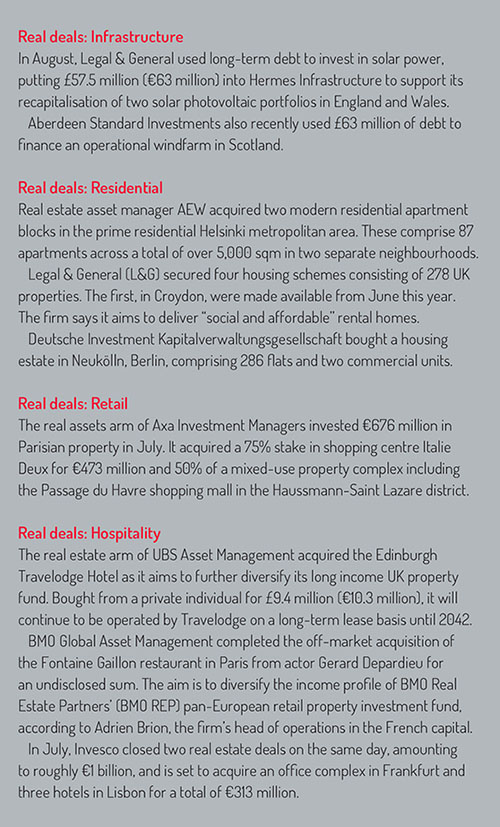Ahead of the MIPIM UK real estate event, Alex Rolandi speaks to participants about the outlook for property and highlights trends such as multi-use premises and build-to-rent.
One of the industry’s largest real estate conferences, the MIPIM UK Summit, takes place this month against a challenging backdrop for the asset class. This is due to economic uncertainty, particularly in the UK, where a no-deal Brexit is looking more probable.
Yet UBS Asset Management still described investor demand for property across most locations and real estate sectors in Europe as high recently, despite lower confidence in the economy and the recession fears haunting markets.
Jay Kwan, managing director of real estate, Europe at Vancouver-based QuadReal, is one of the conference speakers. “I don’t want to be naïve and put on blinders, but an uncertain economic and geopolitical climate doesn’t necessarily mean it’s an unattractive time to invest,” he says.
Investors need to focus on long-term strategy and not be so distracted by fluctuating political trends, he says – though they should be mindful of any volatility that may come in such an environment. “Instead, I think what will differentiate investors in this current climate will be resilience of capital structure, in addition to adhering to basic real estate fundamentals. Given the high level of uncertainty today, perhaps the best defence is having sufficiently permanent capital to make any short to medium-term political changes more benign to overall performance.”
The current situation does, however, make it difficult to be confident about any conviction in a real estate investment thesis, Kwan says.
“On the one hand, you have a continued accommodative interest rate environment coupled with secular and structural drivers that make certain sectors potentially interesting to wade into. On the other hand, these tailwinds are fighting against cyclical and political headwinds, with the latter being a wholly unpredictable process by nature.”
Foundations in place
One more notable point about real estate trends is that, despite growing concern among some investors of a sustained downturn, allocations to global infrastructure are expected to increase over the next three years. This is according to a study published in June by London-based investment firm Foresight Group, who surveyed UK-based financial advisers.
Nearly 100% of them were worried about an economic downturn – yet just over half believed Brexit uncertainty would be a key driver for investment in global infrastructure funds as clients sought to minimise risk in their portfolios.
Joanne McNamara, a managing director and head of Europe at Oxford Properties, points out the role that interest rates are playing.
“The current lower-for-longer interest rates have made real assets popular with investors across many markets who are in search of positive yields, along with capital protection, during these times of market and political volatility,” she says.
She adds that infrastructure investment offers “reliable demographic-backed returns” due to global urbanisation trends that centre on “gateway” cities and on Asia and particularly China, where massive investment in the regions is rapidly increasing the opportunities available.
McNamara is also a speaker at the MIMPIM UK event. She argues that the ambition to create more ‘smart cities’ across the globe will require significant investment in infrastructure so that technology and real estate become more intertwined.
“While the dual propellers of urbanisation and e-commerce growth have been major drivers of the property industry in recent years – and will continue to be for the foreseeable future – the expansion in data consumption looks set to be the next key trend,” she says.
“Fast, reliable connectivity is already crucial to the way we live and do business and the introduction of 5G is likely to double our data use in the coming years. Data centres and the related infrastructure required to support this present a real opportunity for investors looking for secure income streams.”
 The application of technology in the built environment is increasingly prevalent and will accelerate further, says Harry Badham, UK head of development at Axa Investment Managers’ real assets business, as will the emergence of ‘greener’ properties.
The application of technology in the built environment is increasingly prevalent and will accelerate further, says Harry Badham, UK head of development at Axa Investment Managers’ real assets business, as will the emergence of ‘greener’ properties.
“In addition to the huge potential for solutions which simplify design and construction to lead to faster building, standardisation and off-site manufacture, technology also allows for the more efficient and greener management of real estate, saving time, cost and energy,” he says.
According to Badham, one of the most profound changes that technology can facilitate is the evolution of the multi-use concept. In the future, he believes, it will become the norm for real estate.
“This will have virtually no limits; think of a hotel-residential-office-café-showroom-shop-storage-leisure all as one. This is ever-more possible with technology and access control solutions – [such as] sensors, smart locks, bio-security – as well as the rise of transparent, pay-as-a-service commercial models,” he says.
Social responsibility
With the 2019 event, it will be five years since the first MIPIM UK Summit took place. One of the country’s largest real estate conferences, it brings together investors and local authorities – and the aim, say organisers, is to be at the intersection of land, buildings, infrastructure, environment, economics, society, culture and technology.
At the first conference in 2014, delegates and speakers were met by a small crowd of protestors demanding “homes for people, not profit, housing for need, not greed”.
Since then, real estate asset managers such as Legal & General (L&G) have become increasingly active in the build-to-rent property sector. In June, L&G secured four housing schemes as part of its plan to deliver 3,000 affordable homes annually over the next four years.
With the UK in a housing crisis and asset managers parading green and ethical investments, this kind of real estate strategy appears to have a tint of social responsibility. Axa IM’s Badham sees a role for this.
“As supply chains grow longer, wider and more complex, the role of the real estate investor/developer is critical in unifying a shared purpose,” he says. “Social responsibility and engagement, rather than being a burden, will be critical to engaging both supply chains and customers as well as the wider market.”
Sara Bailey, head of real estate at international law firm Trowers & Hamlins and a member of the MIPIM UK advisory board, believes property companies have a social obligation.
“The quality of the built environment has a large impact on our quality of life. The places we live and work in have tangible and symbolic importance. There is therefore a direct responsibility for everyone working in real estate to deliver the best places and spaces possible,” she says.
Trowers & Hamlins recently completed research setting out criteria for developers, investors, public authorities and others to measure the social impact of developments. The firm argues that qualifying the social value of a development means it is possible to understand the long-term impacts and benefits for the development itself and for the wider community.
“Many practitioners within real estate are now looking at this area, such as the British Property Federation, which has also undertaken research on how the property industry can enhance and communicate its value to society,” says Bailey. fe
MIPIM UK Summit takes place at Old Billingsgate, London on October 14-15.
©2019 funds europe





